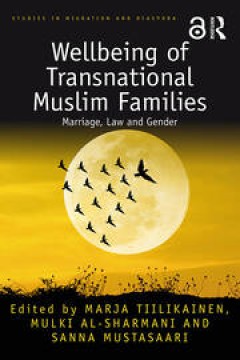Filter by

The Routledge Companion to Global Renaissance Art
This companion examines the global Renaissance through object-based case studies of artistic production from Africa, Asia, the Americas, and Europe in the early modern period. The international group of contributors take an art historical approach characterized by close analysis of form and meaning as well as function, and a focus on questions of crosscultural dialogue and adaptation. Seekin…
- Edition
- -
- ISBN/ISSN
- 9781003294986
- Collation
- -
- Series Title
- -
- Call Number
- -

Meanings of Public and the Future of Public Services
Critically assessing meanings of the term "public", this book situates the emergence and expansion of "public services" within market-based forms of production and consumption. It highlights the potential for making public services more progressive within market societies, but underscores their ongoing capture by private interests and emphasises the inherent limits of reform within a "bourge…
- Edition
- -
- ISBN/ISSN
- 9781003293002
- Collation
- -
- Series Title
- -
- Call Number
- -

Nigeria's Third-Generation Literature
This book considers the evolution and characteristics of Nigeria’s third-generation literature, which emerged between the late 1980s and the early 1990s and is marked by expressive modes and concerns distinctly different from those of the preceding era. The creative writing of this period reflects new sensibilities and anxieties about Nigeria’s changing fortunes in the post-colonial era.…
- Edition
- -
- ISBN/ISSN
- 9781003290186
- Collation
- -
- Series Title
- -
- Call Number
- -

Communities and Museums in the 21st Century
Communities and Museums in the 21st Century brings together innovative, multidisciplinary perspectives on contemporary museology and participatory museum practice that contribute to wider debates on museum communities, heritage, and sustainability. Set within the context of globalisation and decolonisation, this book draws upon bi-regional research that will enrich our understanding of the c…
- Edition
- -
- ISBN/ISSN
- 9781003288138
- Collation
- -
- Series Title
- -
- Call Number
- -

Belonging and Transnational Refugee Settlement: Unsettling the Everyday and t…
The Open Access version of this book, available at https://www.taylorfrancis.com/books/e/9781315268958, has been made available under a Creative Commons Attribution-Non Commercial-No Derivatives 4.0 license. The image we have of refugees is one of displacement – from their homes, families and countries – and yet, refugee settlement is increasingly becoming an experience of living simultane…
- Edition
- -
- ISBN/ISSN
- 9781315268958
- Collation
- -
- Series Title
- -
- Call Number
- -

Wellbeing of Transnational Muslim Families : Marriage, Law and Gender
ABSTRACT This book examines the needs, aspirations, strategies, and challenges of transnational Muslim migrants in Europe with regard to family practices such as marriage, divorce, and parenting. Critically re-conceptualizing ‘wellbeing’ and unpacking its multiple dimensions in the context of Muslim families, it investigates how migrants make sense of and draw on different norms, laws, and…
- Edition
- -
- ISBN/ISSN
- 9781315231976
- Collation
- -
- Series Title
- -
- Call Number
- 300

Rampage Shootings and Gun Control: Politicization and Policy Change in Wester…
While the causes of rampage violence have been analysed thoroughly in diverse academic disciplines, we hardly know anything about the factors that affect their consequences for public policy. This book addresses rampage shootings in Western Europe and their conditional impact on politicization and policy change in the area of gun control. The author sets out to unravel the factors that facilit…
- Edition
- -
- ISBN/ISSN
- 9781315209425
- Collation
- -
- Series Title
- -
- Call Number
- -

Gender and Precarious Research Careers : A Comparative Analysis
The literature on gender and science shows that scientific careers continue to be characterised – albeit with important differences among countries – by strong gender discriminations, especially in more prestigious positions. Much less investigated is the issue of which stage in the career such differences begin to show up. Gender and Precarious Research Careers aims to advance the debate …
- Edition
- -
- ISBN/ISSN
- 9781315201245
- Collation
- -
- Series Title
- -
- Call Number
- -

Ahmadiyya Islam and the Muslim Diaspora Living at the End of Days
This book is a study of the UK-based Ahmadiyya Muslim community in the context of the twentieth-century South Asian diaspora. Originating in late nineteenth-century Punjab, the Ahmadis are today a vibrant international religious movement; they are also a group that has been declared heretic by other Muslims and one that continues to face persecution in Pakistan, the country the Ahmadis made the…
- Edition
- -
- ISBN/ISSN
- 9781315197289
- Collation
- -
- Series Title
- -
- Call Number
- -

Becoming-Social in a Networked Age
This book examines the semiotic effects of protocols and algorithms at work in popular social media systems, bridging philosophical conversations in human-computer interaction (HCI) and information systems (IS) design with contemporary work in critical media, technology and software studies. Where most research into social media is sociological in scope, Neal Thomas shows how the underlying mat…
- Edition
- -
- ISBN/ISSN
- 9781315195629
- Collation
- -
- Series Title
- -
- Call Number
- -
 Computer Science, Information & General Works
Computer Science, Information & General Works  Philosophy & Psychology
Philosophy & Psychology  Religion
Religion  Social Sciences
Social Sciences  Language
Language  Pure Science
Pure Science  Applied Sciences
Applied Sciences  Art & Recreation
Art & Recreation  Literature
Literature  History & Geography
History & Geography